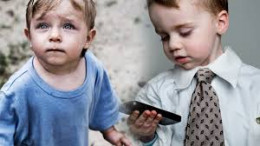Why are large families ALWAYS dependent upon outside assistance to keep them soc
Why are large families ALWAYS dependent upon outside assistance to keep them socioeconomically
afloat as opposed to small families who are very socioeconomically self-sufficient? Typical large families are poor to impoverished socioeconomically. That means that in order to be socioeconomically viable, large families receive socioeconomic assistance, even are supported by their more affluent relatives, the government, and other charities. What makes parents have MORE children than they can support by themselves without outside assistance. This act is selfish and irresponsible.
What are you basing this assumption on? Do you know ALL large families? The Kennedys spring to mind. They seemed pretty well off. In fact, when I was a child I knew lots of Catholic families with 8 or more children, who seemed fairly well off.
The large families that I knew were impoverished and at best, very lower income. These families had to be assisted by others. They weren't self-sustaining families at all. The more affluent people in my community had to DONATE to SUCH FAMILIES.
Thanks for making this point. He needs to be clearer sooner in his original proposition. As it is, the question sounds fairly stupid, absolute, and judgmental.
Question isn't stupid nor biases.I KNOW large families and they ARE POOR or IMPOVERISHED.They MUST be assisted by others to survive by more affluent relatives, the government & charities due to the parents' stupidity and selfishness.
But your article wasn't that specific, large families that YOU knew. You were very general. There are also SMALL poor families that depend on altruism, be it charity or the government. You're pointing fingers at people without empathy.
Poor small families are VERY FEW. There's a PREDOMINANCE of poor large families. Large families are ASSOCIATED with poverty.One can tell a child from a large family from one in a small family. H/she is in need of some type of aid.
I'm not convinced large families are necessarily a sign of selfishness; sometimes it's a lack of access to birth control, and sometimes it's a religious thing; I do know Roman Catholics who follow the teachings of the church in regard to birth control, for instance. The fact that politicians are attacking Planned Parenthood and succeeding in defunding them in some places doesn't help.
Raising kids costs a lot of money, and unless someone has a really good job, it's hard to make ends meet. With a large family, it probably makes more sense for one parent to stay home rather than pay for day care, so that's a potential limit on income right there.
I've seen large families get by with little to no assistance by growing much of their own food and by making their own clothes and/or shopping at thrift shops; they're not all on the public dole. For those who are, it makes more sense to give public assistance than to let the kids suffer for the actions of their parents.
I do think planning to have huge families (like the Duggers on "19 and Counting" is irresponsible in terms of what is does to kids being raised in such a crowded, chaotic environment. I've heard people say that "you don't divide your love, you multiply it" in large families. A friend of mine who grew up in a large family and who often felt lost in the shuffle responded, "you may not divide your love, but you surely divide your time." That's my real worry.Cynically, the right needs more people who, because they are poor, are likelier as fodder for the prison industrial complex. Poverty is good business, except for the poor. They are also good for scapegoating, and the more of them, the better.
There IS a STRONG correlation between large families and socioeconomic impoverishment.Children in large families adopt a POVERTY consciousness, mindset & mentality. To them, poverty is a normal lifestyle & don't want to go beyond that.
- Nadia Ribaduposted 8 years ago
0
There is a fallacy in the question, as it assumes there are no LARGE WEALTHY families! Newsflash: There ARE! The question should be reorganized to ask, “Why are large, POOR families always dependent upon assistance to keep the socioeconomically afloat?” Even then, the ANSWER would be obvious. Even if obvious, there are large working-poor families who STRUGGLE and do their best to AVOID reliance on charity or the social safety net. It's a rather absolute and unfair characterization of large families without qualifications stated in your proposition, or maybe not soon enough to be clear as to what you mean.
Wealthy large families? Who are you kidding? Large families, for the most part, are socioeconomically poor to impoverished. Such families depend upon outside assistance to survive. They are on the societal periphery.
If you had cited some "respectable" statistics to support your argument, which assumes a lot and generalizes, it would have made for a far more intelligent read.
I have studied the family extensively and my parents came from VERY LARGE families. They were poor but fortunately they became solidly middle class. All the large families I KNOW and OBSERVED were either poor or poverty stricken.
Sorry, Grace. It took me a while to realize the writer of the piece is in fact a SHE. I used the other pronoun.

There is a very strong correlation between large families and socioeconomic poverty. People who have large families tend to be less educated than those who have small families. They do not have the cognizance that small families means more socioeconomic opportunities for them & particularly their children.
They have children, not caring how a large number of children will set them further into socioeconomic impoverishment. In large families, monies are tight, even for the necessities It is normative for them to do without. Because there is so little money to go around in large families, the average large families have to be assisted by relatives, the government, & outside organizations. Many children in large families do not receive the proper nutrition as quality food is expensive, beyond the reach of the average large family. So they consume inferior quality food. The only way for children in large families to consume nutritious food is through school programs.
Large families must depend upon charities and donations for even the simple rudiments such as clothes which their parents can ill afford.It is quite common for children in large families to wear secondhand or cast off clothing.The image that comes to mind of large families is children being ill or malnourished or badly clothed because of their parents' thoughtless and unorganized behavior regarding the issue of family planning.
Children in large families sense their lack.They see other children having what they DON'T have. Many become envious. Instead of criticizing their parents, they attack the more affluent children.It is common for children in large families to lack the basic essentials such as school supplies & other necessities when they start school. In some school,children in large families depend upon outside school donations for clothing & school supplies.
It is very irresponsible for parents to have large families, reducing them & their children to a hellish life of socioeconomic penury & struggle. What are these "parents" "thinking"? Oops, they aren't thinking at all.They have this narcissistic urge to reproduce regardless of the negative consequence for their families. As a result of growing up in poverty, children from large families accept, even embrace poverty, not wanting anything else. They even see a middle class or better lifestyle as somehow aberrant. Poverty consciousness, mentality, mindset, & psychology are very commonplace in large families.They're not always... around here most are sustained by their fathers owning construction businesses. They live in large houses, have up to 12 kids with one stay at home mom, and I can't say they appear to be financially hurting... Although, yes, if you do not happen to be wealthy or a business owner you probably shouldn't raise a large brood. There was a time when this was necessary to keep the farm running but this really isn't true nowadays.
I know that GM will never acknowledge it, but there are a lot of really poor single moms out there with just one kid.
Related Discussions
- 48
Irresponsible Parents....YES, They Do.....EXIST
by Grace Marguerite Williams 3 years ago
Why do people have children, knowing that they CAN'T afford to give them a life beyond impoverishment, scarcity, & struggle? Such "parents" know that they can't provide their children cultural, educational, intellectual, & socioeconomic opportunities like normal parents do...
- 23
Do you believe that poorer and/or less educated people have more children whom t
by H C Palting 5 years ago
Do you believe that poorer and/or less educated people have more children whom they can't support?Do you know any ill effects to the child(ren) born to these families and society? If so, what are they?
- 45
What is the root cause of poverty in the world?
by Christian L Perry 5 years ago
What is the root cause of poverty in the world?
- 156
What causes parents to knowingly have large/very large families
by Grace Marguerite Williams 9 years ago
(6 or more children per household) in the postmodern, 21st century United States, being fully cognizant of the fact that they will be subjecting their children to an extremely rudimentary and primitive socioeconomic living standard, even socioeconomic penury and poverty? Countless studies...
- 23
Should there be a limit to the amount of children one family should have in the
by Rodric Anthony Johnson 10 years ago
Should there be a limit to the amount of children one family should have in the US?We know in some countries like China the government tells people the amount of children to have. Should we look into that for America?
- 14
Is having more than two children unresponsible?
by Raymond Philippe 10 years ago
Is having more than two children unresponsible?










